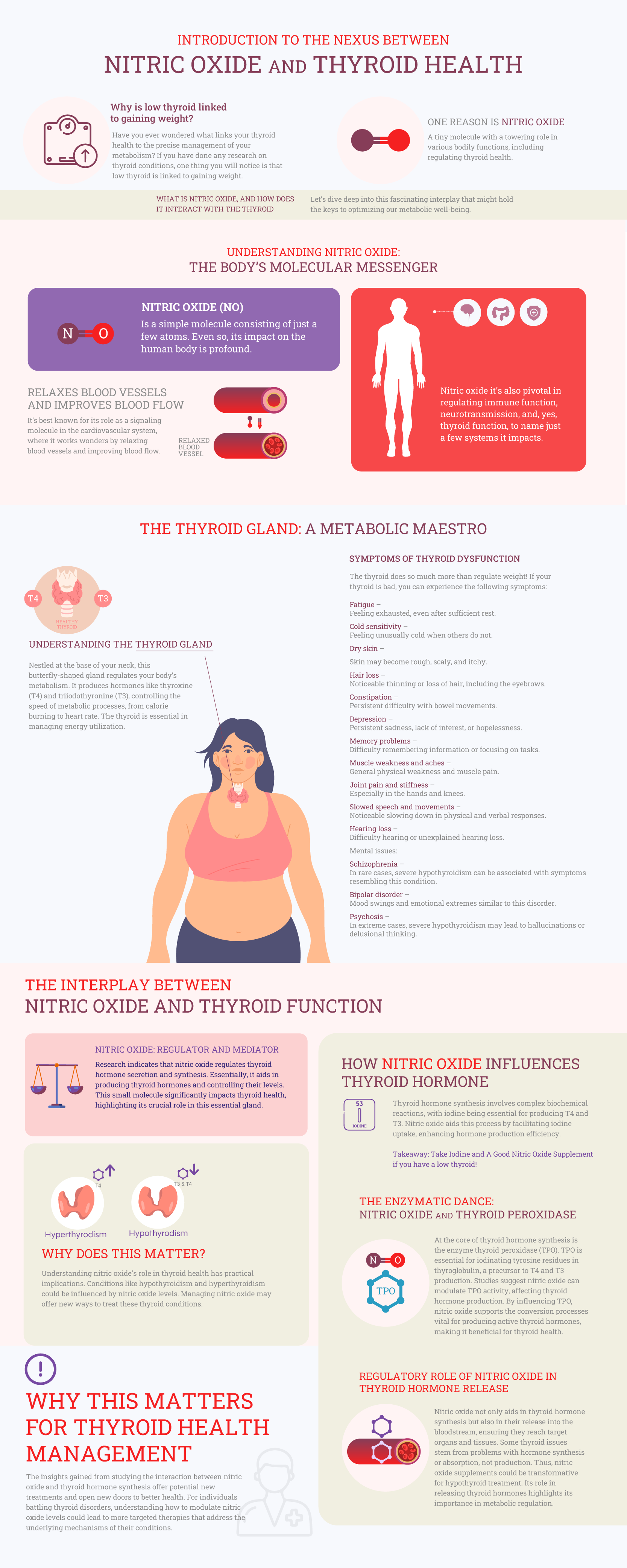Introduction to the Nexus between Nitric Oxide and Thyroid Health
Have you ever wondered what links your thyroid health to the precise management of your metabolism? If you have done any research on thyroid conditions, one thing you will notice is that low thyroid is linked to gaining weight. Why is low thyroid linked to gaining weight?
One reason is nitric oxide, a tiny molecule with a towering role in various bodily functions, including regulating thyroid health. What is nitric oxide, and how does it interact with the thyroid gland? Let’s dive deep into this fascinating interplay that might hold the keys to optimizing our metabolic well-being.
Understanding Nitric Oxide: The Body’s Molecular Messenger
Nitric oxide (NO) is a simple molecule consisting of just a few atoms. Even so, its impact on the human body is profound. It’s best known for its role as a signaling molecule in the cardiovascular system, where it works wonders by relaxing blood vessels and improving blood flow.
But the scope of nitric oxide extends far beyond the heart and blood vessels; it’s also pivotal in regulating immune function, neurotransmission, and, yes, thyroid function, to name just a few systems it impacts.
The Thyroid Gland: A Metabolic Maestro
Before connecting the dots between nitric oxide and thyroid health, let’s take a moment to understand the thyroid gland itself. Nestled at the base of your neck, this butterfly-shaped gland is the master conductor of your body’s metabolism. It produces hormones like thyroxine (T4) and triiodothyronine (T3), which dictate the speed of your metabolic processes. From how quickly you burn calories to how fast your heart beats, the thyroid is integral in managing how your body utilizes energy.
The thyroid does so much more than regulate weight! If your thyroid is bad, you can experience the following symptoms:
- Fatigue – feeling exhausted, even after sufficient rest.
- Cold sensitivity – feeling unusually cold when others do not.
- Dry skin – skin may become rough, scaly, and itchy.
- Hair loss – noticeable thinning or loss of hair, including the eyebrows.
- Constipation – persistent difficulty with bowel movements.
- Depression – persistent sadness, lack of interest in activities, or a feeling of hopelessness.
- Memory problems – difficulty remembering information or focusing on tasks.
- Muscle weakness and aches – general physical weakness and muscle pain.
- Joint pain and stiffness – especially in the hands and knees.
- Slowed speech and movements – noticeable slowing down in physical and verbal responses.
- Hearing loss – difficulty hearing or unexplained hearing loss.
- Mental issues:
- Schizophrenia – in rare cases, severe hypothyroidism can be associated with symptoms resembling this condition.
- Bipolar disorder – mood swings and emotional extremes similar to this disorder.
- Psychosis – in extreme cases, severe hypothyroidism may lead to hallucinations or delusional thinking.

The Interplay Between Nitric Oxide and Thyroid Function
So, back to the wonders of nitric oxide. Research suggests that nitric oxide has a dual role in thyroid function. It acts both as a regulator of thyroid hormone secretion and as a mediator in thyroid hormone synthesis. So what does that mean? Basically, it helps produce thyroid hormones and helps control how much is made and used.
Nitric oxide plays a critical role in your thyroid health. This is because thyroid hormones can influence how much thyroid hormone your body produces. Isn’t it intriguing how something so small can significantly impact a gland so crucial?Beyond
Why Does This Matter?
Understanding the relationship between nitric oxide and thyroid health has practical implications for millions of people worldwide. Many of these are people who suffer from thyroid disorders like myself. Conditions such as hypothyroidism (an underactive thyroid) and hyperthyroidism (an overactive thyroid) could be influenced by the levels and activity of nitric oxide in the body. Understanding and controlling your own nitric oxide levels may unlock new approaches to managing these conditions.
How Nitric Oxide Influences Thyroid Hormone
The synthesis of thyroid hormones is a complex mix of biochemical reactions within the thyroid gland. Central to this process is iodine, an essential element that the thyroid gland must have to produce thyroxine (T4) and triiodothyronine (T3). Here’s where nitric oxide comes into play: it is believed to facilitate the uptake of iodine by the thyroid gland, serving as a catalyst that enhances the efficiency of hormone production.
Takeaway: Take Iodine and A Good Nitric Oxide Supplement if you have a low thyroid!
The Enzymatic Dance: Nitric Oxide and Thyroid Peroxidase
At the heart of thyroid hormone synthesis is an enzyme known as thyroid peroxidase (TPO). TPO is crucial for the iodination of tyrosine residues in thyroglobulin, which is a precursor to the production of T4 and T3.
So, if you are like me, you read over that last part and just said OK, those are a lot of words I don’t understand. To be honest, I am not sure what tyrosine residues are myself. However, I do know that studies suggest that nitric oxide can modulate the activity of TPO, potentially affecting the rate at which thyroid hormones are produced. By influencing TPO activity, nitric oxide helps regulate the conversion processes that are vital for the production of active thyroid hormones. So, in short, nitric oxide supports TPO, which means if you have a low thyroid, it is definitely a good thing!
Regulatory Role of Nitric Oxide in Thyroid Hormone Release
Because it goes beyond just synthesis, nitric oxide also releases thyroid hormones into the bloodstream. This step is vital for ensuring that these hormones can reach their target organs and tissues, where they go to work.
Some people with thyroid issues do not have a problem with producing thyroid; they have a problem synthesizing or absorbing it. That means using a nitric oxide supplement as part of your hypothyroid health regimen could be a game changer for many!
Because of nitric oxide’s role in facilitating the release of thyroid hormones, it truly underscores its importance in fine-tuning metabolic regulation.
Why This Matters for Thyroid Health Management
The insights gained from studying the interaction between nitric oxide and thyroid hormone synthesis offer potential new treatments and open new doors to better health. For individuals battling thyroid disorders, understanding how to modulate nitric oxide levels could lead to more targeted therapies that address the underlying mechanisms of their conditions.
